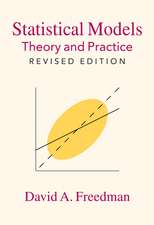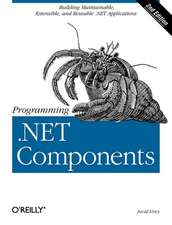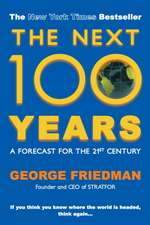The Bed of Procrustes
Autor Nassim Nicholas Taleben Limba Engleză Paperback – 25 oct 2016
The Bed of Procrustes takes its title from Greek mythology: the story of a man who made his visitors fit his bed to perfection by either stretching them or cutting their limbs. It represents Taleb’s view of modern civilization’s hubristic side effects—modifying humans to satisfy technology, blaming reality for not fitting economic models, inventing diseases to sell drugs, defining intelligence as what can be tested in a classroom, and convincing people that employment is not slavery.
Playful and irreverent, these aphorisms will surprise you by exposing self-delusions you have been living with but never recognized.
With a rare combination of pointed wit and potent wisdom, Taleb plows through human illusions, contrasting the classical values of courage, elegance, and erudition against the modern diseases of nerdiness, philistinism, and phoniness.
| Toate formatele și edițiile | Preț | Express |
|---|---|---|
| Paperback (2) | 56.55 lei 26-32 zile | +17.77 lei 7-13 zile |
| Penguin Books – 26 oct 2016 | 56.55 lei 26-32 zile | +17.77 lei 7-13 zile |
| Random House LLC US – 25 oct 2016 | 108.92 lei 17-23 zile | +9.44 lei 7-13 zile |
| Hardback (1) | 135.11 lei 3-5 săpt. | |
| Random House – 31 oct 2010 | 135.11 lei 3-5 săpt. |
Preț: 108.92 lei
Nou
20.85€ • 21.48$ • 17.60£
Carte disponibilă
Livrare economică 04-10 februarie
Livrare express 25-31 ianuarie pentru 19.43 lei
Specificații
ISBN-10: 0812982401
Pagini: 208
Dimensiuni: 128 x 203 x 17 mm
Greutate: 0.18 kg
Editura: Random House LLC US
Colecția Random House Trade Paperbacks
Notă biografică
Taleb’s books have been published in forty-one languages.
Recenzii
“The most prophetic voice of all.” —GQ
“The hottest thinker in the world.” —Bryan Appleyard, The Sunday Times (London)
“[Taleb writes] in a style that owes as much to Stephen Colbert as it does to Michel de Montaigne.” —The Wall Street Journal
“Idiosyncratically brilliant.” —Niall Ferguson, Los Angeles Times
Descriere
By the author of the modern classic The Black Swan, this collection of aphorisms and meditations expresses his major ideas in ways you least expect.
The Bed of Procrustes takes its title from Greek mythology: the story of a man who made his visitors fit his bed to perfection by either stretching them or cutting their limbs. It represents Taleb’s view of modern civilization’s hubristic side effects—modifying humans to satisfy technology, blaming reality for not fitting economic models, inventing diseases to sell drugs, defining intelligence as what can be tested in a classroom, and convincing people that employment is not slavery.
Playful and irreverent, these aphorisms will surprise you by exposing self-delusions you have been living with but never recognized.
With a rare combination of pointed wit and potent wisdom, Taleb plows through human illusions, contrasting the classical values of courage, elegance, and erudition against the modern diseases of nerdiness, philistinism, and phoniness.
Extras
If you want people to read a book, tell them it is overrated. - You never win an argument until they attack your person. - Nothing is more permanent than “temporary” arrangements, deficits, truces, and relationships; and nothing is more temporary than “permanent” ones. - The most painful moments are not those we spend with uninteresting people; rather, they are those spent with uninteresting people trying hard to be interesting. - Hatred is love with a typo somewhere in the computer code, correctable but very hard to find. I wonder whether a bitter enemy would be jealous if he discovered that I hated someone else. - The characteristic feature of the loser is to bemoan, in general terms, mankind’s flaws, biases, contradictions, and irrationality—without exploiting them for fun and profit. - The test of whether you really liked a book is if you reread it (and how many times); the test of whether you really liked someone’s company is if you are ready to meet him again and again—the rest is spin, or that variety of sentiment now called self-esteem. - We ask “why is he rich (or poor)?” not “why isn’t he richer (or poorer)?” “why is the crisis so deep?” not “why isn’t it deeper?” Hatred is much harder to fake than love. You hear of fake love; never of fake hate. - The opposite of manliness isn’t cowardice; it’s technology. - Usually, what we call a “good listener” is someone with skillfully polished indifference. - It is the appearance of inconsistency, and not its absence, that makes people attractive. - You remember emails you sent that were not answered better than emails that you did not answer. People reserve standard compliments for those who do not threaten their pride; the others they often praise by calling “arrogant.” - Since Cato the Elder, a certain type of maturity has shown up when one starts blaming the new generation for “shallowness” and praising the previous one for its “values.” - It is as difficult to avoid bugging others with advice on how to exercise and other health matters as it is to stick to an exercise schedule. - By praising someone for his lack of defects you are also implying his lack of virtues. - When she shouts that what you did was unforgivable, she has already started to forgive you. Being unimaginative is only a problem when you are easily bored. - We call narcissistic those individuals who behave as if they were the central residents of the world; those who do exactly the same in a set of two we call lovers or, better, “blessed by love.” -
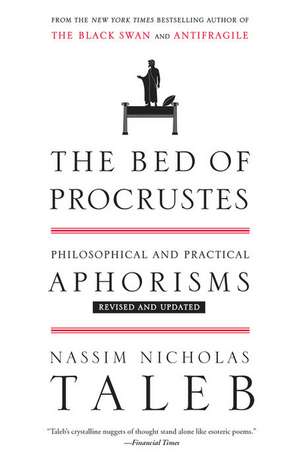


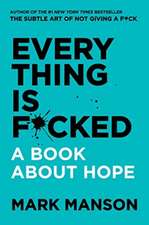

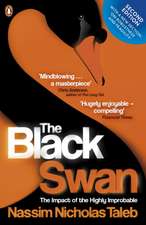






![The Way of Zen =: [Zendao]](https://i0.books-express.ro/bt/9780375705106/the-way-of-zen.jpg)
